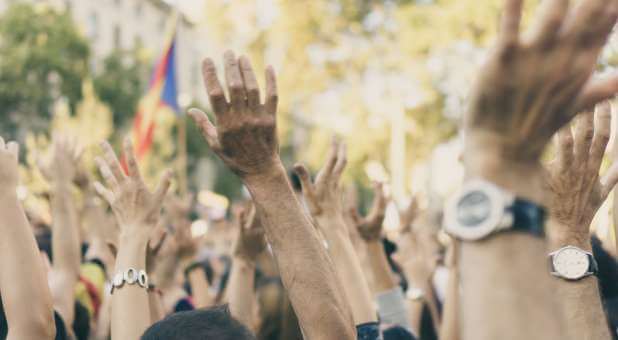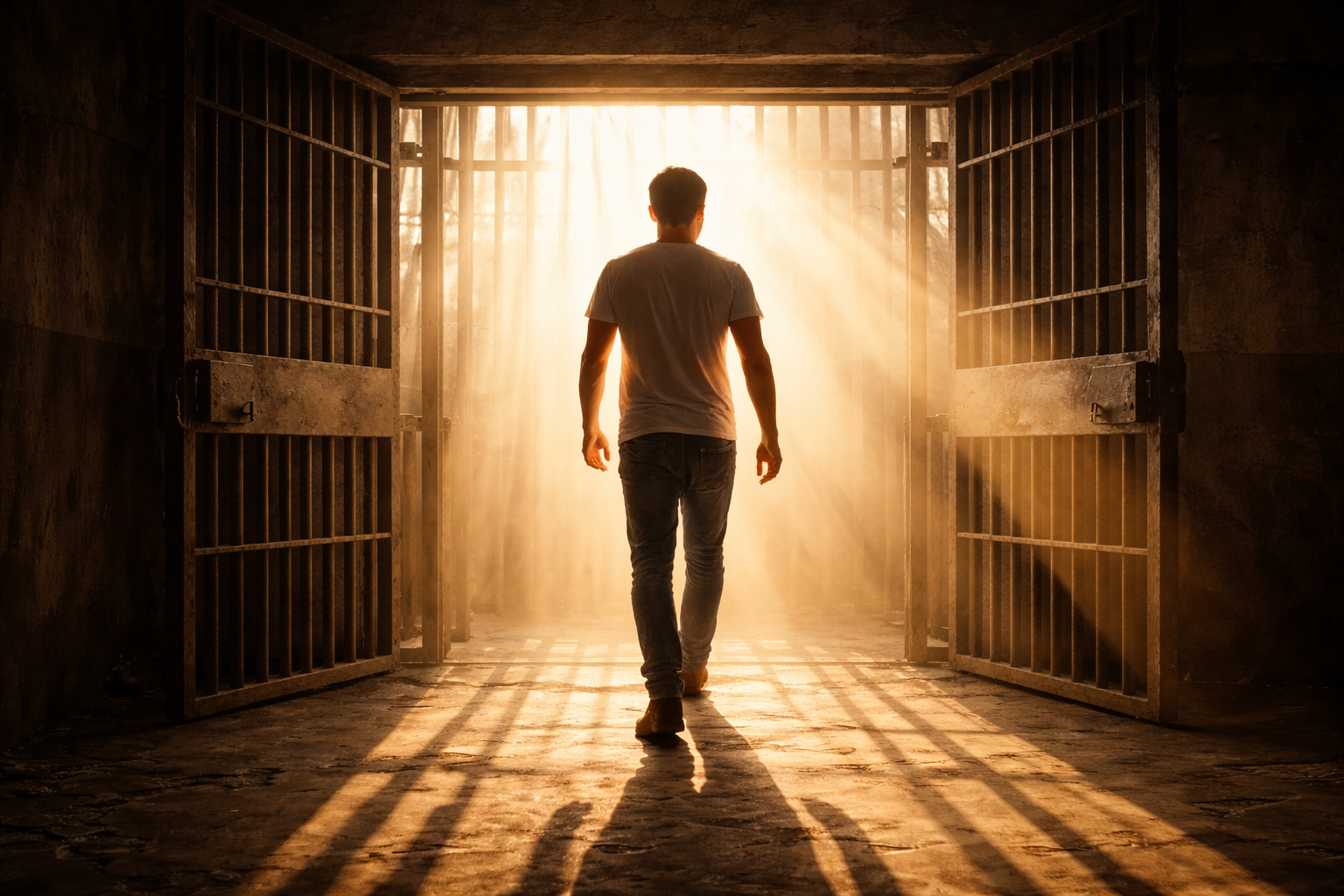The horrific termination of the life of George Floyd has traumatized the nation beyond any single act of aggression against an individual since the assassination of Dr. Martin Luther King Jr. in 1968. The murder of Dr. King resulted in rioting and burning of over 100 American cities. This is similar to what we see today. Due to our common humanity, the unbearable image of seeing a police officer’s knee on the neck of Mr. Floyd traumatized not just African Americans, but all decent citizens. George Floyd represented all of us as human beings. Floyd’s death has now transcended his own solitary life, becoming a symbol for reform. As a result, we all now have the opportunity to press the reset button on relations among all ethnic groups, especially between Caucasians and African Americans. As Americans, we have the opportunity to heal historical differences that have divided us. The question currently being asked is, “How will we respond?”
How will believers on the right and left respond?
My primary ethic and ethos for living in conformity to the kingdom of God has been the Beatitudes found in Matthew 5-7. If Christians, irrespective of which political party or ideology, would simply live by this standard, it would far outweigh everything else needed to rectify societal maladies.
To My Christian Brothers and Sisters on the Right
I have learned, from personal experience and Scripture reading, that in order to be a true Christ follower, one has to enter into the pain of another before speaking and giving opinions. As Stephen Covey says in his book, The 7 Habits of Highly Effective People, we need to “understand before we make ourselves understood.”
When Jesus gave the Sermon on the Mount, He made it clear that to genuinely represent His kingdom and to function as the salt and light of the world, certain prerequisites related to attitude and approach were necessary. He said that we had to be “poor in spirit,” “meek,” “merciful,” “mourn with others,” “hunger and thirst for righteousness” and be “peacemakers” in order to function as the salt of the earth and light of the world (Matt. 5:1-16).
Every one of those Christlike attitudes had to do with demonstrating love and empathy toward “the other.” He spoke about having a broken, empathetic, merciful heart so as to represent Him. In this context, hungering for righteousness implies a yearning for a society that treats fellow human beings fairly. This would include standing for laws, policies and community standards that break cycles of poverty instead of perpetuating them. (For more on this subject, read Discrimination and Disparities written by a prominent black economist, Thomas Sowell.)
Being present in the lives of others before being understood is the method that Jesus, as the Word, utilized. He left His heavenly abode and took upon Himself human flesh (John 1:14, Phil. 2:4-12). This mysterious and extraordinary incarnation took place so He could feel our pain and relate to human fragility and temptation (Heb. 2:16-17).
I have learned that when you take the time to get to truly know a person and understand his personal narrative, categorical terms such as “left” and “right” are not very important. Although ideologies are significant and determine the philosophy and politics of a society, love is more powerful and transcends all. Love will eventually conquer the world through our God, who embodies love (1 John 4:8). If you have the correct ideology but do not display love, your belief system means nothing (1 Cor. 13:1-3). However, it is also true that if we truly love our neighbor, we will stand up for values that will aid human flourishing.
That being said, it is time for white Christians to enter the historical narrative and pain of the African American soul. Doing so will allow us to have a greater dialogue and form true partnerships that will aid in seeing a better America. If we are not able to empathize with the pain of others, we have no authority to speak to them. We, as the church, need to be “present” with our African American brothers and sisters during this crisis.
How Will the Left Respond?
This is an amazing opportunity for progressives who tilt to the left politically, to appreciate the fact that many of those marching in solidarity with the black community are Caucasians. That alone should speak volumes. There are many white Americans who desire reconciliation rather than division. This can be an opportunity to stop utilizing language used by radical progressives that seeks to pit one group against another; the “us against them” language of class warfare (Marxist ideology) has never been able to lift nations and has failed miserably to bring about a utopian society.
The radical reaction among the left to defund the police and use the extra money to provide more government programs is ludicrous. If the police were not present in American cities, white, black and brown communities would be overrun by roaming militias, vigilantes and violent gangs. This results in more hatred and division.
It is one thing to demand reform in the way the police function in the communities, but another thing altogether to abolish the police force. Unfortunately, the desire of the radical left to defund the police is another example of progressives attempting to put policies in place that will actually result in more systemic poverty. For example, the so-called “Great Society” policies of the 1960s resulted in more generational poverty and fragmentation in many communities of color.
My hope is that the symbol of George Floyd, which has resulted in ethnically mixed protests, helps declaw individual racism and ethnic division. I am praying that the nonviolent, peaceful protests appeal to the consciences of people and are able to win over those who seek to do harm. Groups such as antifa need to disband.
Regarding the Beatitudes, there is a key message for all Christian protesters.
Jesus said that “peacemakers” will be called the children of God. Notice, Jesus did not say “peacemakers” are the children of God, but that they will be called “children of God. We are saved by accepting the faith of the gospel, not by community activism and peacemaking. By implication, the world is so impressed by people who can create peace between people groups that they refer to them as the children of God
Furthermore, it is important to remember that the police are not called to be “peacemakers” but “peacekeepers.” The police are called to serve civil society by maintaining the rule of law and sometimes do so through the use of force if necessary (of course, not through the use of unnecessary force as we saw in the death of George Floyd).
Hence, the police cannot “create peace” but merely “keep the peace.” The church has to rise and be present in our cities; the church should welcome civil discourse. help expand our capacity for understanding and aid in resolving historic wounds.
Peacemaking can only be done by extraordinary individuals. Such individuals understand the importance of seeing various perspectives and are better able to bring healing to their communities because of the Prince of Peace reigning in their hearts. The root of racism is sin, and only Jesus can change the human heart.
Truly, both the left and the right need to reflect during this crisis, or both sides will miss the amazing opportunity for biblical change; this kairos moment has been given to us. My prayer is that Christians on both sides of the political spectrum will humanize each other the way our nation has humanized George Floyd. This huge fissure in our nation caused by race, ideology and politics will take a back seat to true dialogue that’s motivated and guided by the biblical attributes displayed in the Sermon on the Mount.
May the church not waste this opportunity to emulate Jesus and walk as He walked.












































